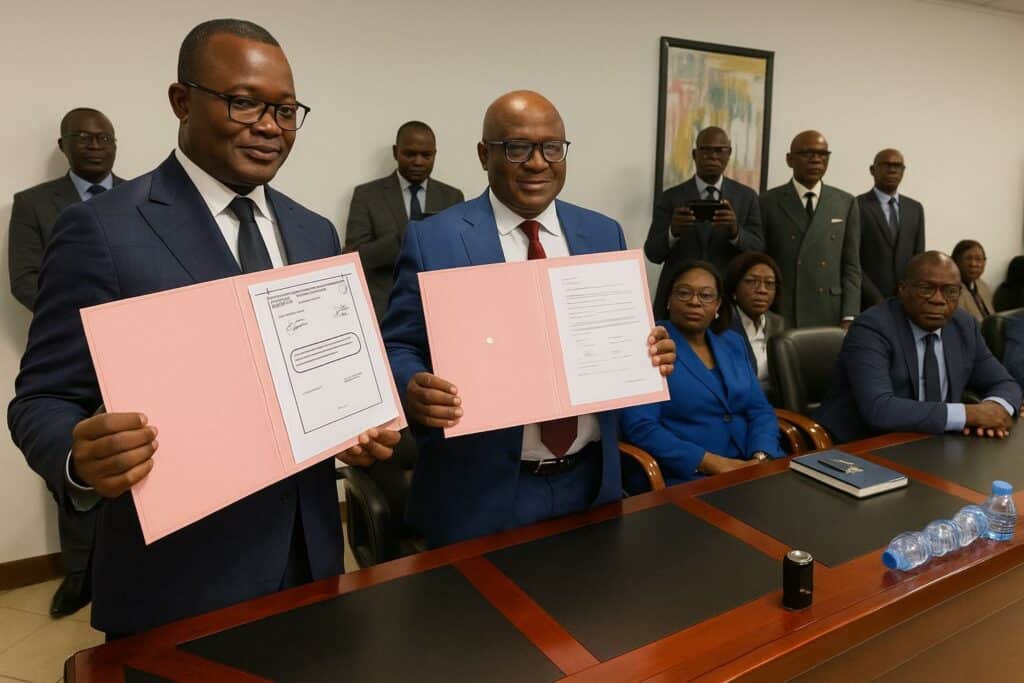Media–Economy Synergy in Brazzaville
When the Congolese Congress of Business Leaders closed ranks with La Nouvelle République on 27 August 2025, seasoned observers noted more than a ceremonial handshake. The pact, witnessed by Antoine Ethai Oviebo, chief of staff to the Minister of Communication and Government Spokesperson, signalled a calculated bid to weave economic dynamism and information flows into a single fabric (Government press release, 27 August 2025). In the carefully worded memorandum, both sides committed themselves to promoting innovation, transparency and enhanced corporate visibility across the Republic of the Congo. The ambition is explicit: craft a mutually reinforcing ecosystem where enterprises expand their reach while media houses deepen their public-interest mandate.
For Brazzaville’s diplomatic community, the timing is instructive. Global commodity fluctuations have urged Congo-Brazzaville to diversify beyond hydrocarbons. In that context, the fusion of a national media flagship with the country’s primary business association appears less a publicity manoeuvre than a strategic response to structural economic imperatives. By seeking “collective strength”, as CCEC President Paul Nestor Mouandzibi Ndinga put it, the stakeholders are positioning themselves as co-architects of the nation’s next development chapter (CCEC statement, 27 August 2025).
An Alliance Framed by Government Oversight
The presence of Antoine Ethai Oviebo gave the signing ceremony institutional gravitas and underscored the administration’s willingness to create convergences between state policy, the private sector and the communications sphere. According to officials at the Ministry of Communication, the agreement dovetails with President Denis Sassou Nguesso’s call for greater public-private coordination in support of national priorities (Ministry briefing notes).
Diplomats highlight that the government’s measured facilitation of the deal avoids any perception of interference, while still ensuring that the partnership advances recognised public-policy goals such as transparency and social cohesion. In practical terms, the ministry’s oversight is expected to translate into streamlined accreditation processes, joint public-awareness campaigns and capacity-building workshops aimed at professionalising both corporate communication units and newsrooms.
La Nouvelle République: A Media Institution Embracing Digital
Founded by decree on 9 November 1998 through the consolidation of Mweti, Congo Magazine and Le Stade, La Nouvelle République enjoys a rare pedigree in the Congolese mediascape. Its print heritage—particularly the celebrated column “Mweti a vu”—has helped shape public discourse for over a quarter of a century. Yet, as Director-General Anasth Wilfrid Mbossa reminded the audience, survival now requires a decisive leap into the digital realm. The group already operates an online daily, a streaming channel branded NRTV, and a vigorous social-media strategy that reaches audiences well beyond Brazzaville (La Nouvelle République archives).
International tie-ups with outlets such as Russia Today, Sputnik and Fraternité Matin furnish additional distribution corridors, while domestic retransmission on the National Television and Radio ensures mass penetration. Against that backdrop, the CCEC alliance is positioned to inject fresh content streams—corporate profiles, innovation showcases, executive interviews—that can heighten readership engagement and attract advertising revenue essential for sustaining independent editorial operations.
CCEC’s Strategic Calculus for Corporate Visibility
Representing a cross-section of Congolese industry, the CCEC has long argued that local firms suffer from an information deficit on both the regional and international stages. Its new media partner offers precisely the amplification mechanism required to shift that narrative. By leveraging La Nouvelle République’s newsroom expertise, the congress intends to project corporate success stories, socially responsible initiatives and market intelligence that can lure investment partners.
Observers note that the CCEC’s decision fits a broader African trend whereby business confederations court reputable media groups to shape national brand images. The practice is seen not as public-relations window-dressing but as a soft-power instrument capable of fostering investor confidence. In Congo-Brazzaville, where the government’s 2022–2026 National Development Plan spotlights innovation and entrepreneurship, the alignment appears particularly germane.
Implications for Congo-Brazzaville’s Development Trajectory
While the partnership is still in its infancy, early indicators suggest reciprocal gains. La Nouvelle République obtains privileged access to corporate data and potential sponsorship streams; the CCEC secures a narrative platform that can translate balance-sheet achievements into reputational capital. Indirectly, the public reaps the informational dividend of more nuanced economic reporting and heightened accountability.
The agreement follows the 22 August 2025 memorandum between La Nouvelle République and the Institut Supérieur Polytechnique-Universitaire, which focused on training journalists and hosting student interns. Taken together, these accords sketch out an embryonic ecosystem linking academia, media and enterprise, each reinforcing the other’s institutional competencies. Diplomatic envoys mindful of regional stability view such cross-sector synergies as a stabilising factor, capable of nurturing a transparent business climate consonant with the African Continental Free Trade Area’s ethos.
Ultimately, the success of the media–business compact will hinge on its ability to balance promotional content with rigorous journalism. By pledging a “win-win dynamic”, the signatories have implicitly accepted that credibility remains the currency through which both economic actors and information brokers derive authority. Should that balance be maintained, the 27 August ceremony may come to be remembered as a modest but meaningful inflection point in Congo-Brazzaville’s trajectory toward diversified and transparent growth.

